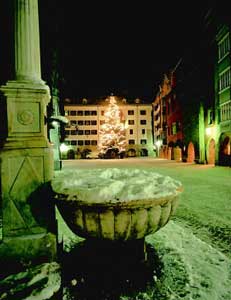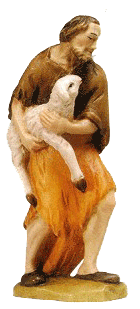|









|
|
- The wonderful story of
Christmas

|
Luke (Chapter 2) is the only one of the evangelists to relate
to the details of the birth of Jesus in Bethlehem. Exegetes and
historians agree that the estimate date of his birth is anterior
to the date given by Dionysius the Thin for the start of the
Christian calendar in the VI century. And of course the date
of December 25 is only there to represent the winter solstice
(the beginning of a new solar year). |
-
- The date of census for which Joseph and Mary had to go
to Bethlehem is difficult to establish. Why these inaccuracies?
This is because the story of Christmas is not an historic report.
The announce of the angels to the shepherds, singing the glory
of God "in the highest" clearly indicates a very different
style of literature compared to an objective report from an historian.
Does it means that it has no meaning? Certainly not, on the contrary,
because any choice made by the evangelist expresses something
stronger than an historical fact.
First of all he wants to insert Jesus in the expectation of the
coming of the Messiah by his people. He should have come from
the family of David, then insisting he be born in Bethlehem,
the City of David, and giving a reason for travelling to Joseph
and Mary.
-
|
Just after that he describes the birth, not like the kings
but in an extreme simplicity: a stable, without a cradle but
"lying in a manger". |

|
In an astonishing few sentences Luke rapidly presented to us
the rich personality of Jesus who showed himself as a master
and a servant, both glorified and scorned. As this child is not
like any "new born wrapped in swaddling cloths" Luke
used a style with wonders to underline the exceptional life that
Jesus will have. Of course the authors of the Gospel know it
well since Luke wrote his Gospel about 40 years after the events
of the life and resurrection of the one they named Lord. In biblical
texts the angels are always present. They are personalities recognized
as carrying a message from God. We see them in huge number, like
a choir singing for the glory of God and then disappear into
heaven. Heaven is understood as the place where God is. When
Jesus was born, one wants us to understand that heaven and earth
are no more separated. In other episodes of Jesus' life, similar
kinds of wonders are used like a voice coming from heaven or
heaven opens itself. God himself in Jesus comes close to humanity.

|
The shepherds were mysteriously told about the birth and they
represented a social category of a bad reputation. They were
considered as tramps or robbers. The decision of Luke to put
them in his story has a reason. Later Jesus will say:" I
did not come for the righteous but for the sinner". The
excluded ones from society were the first to participate to the
new great news of Jesus and believed in it. They were the first
apostles, to leave the stable and to tell every one what the
angels had told them about the child. |
This story is in fact a revelation: God himself specifically
takes a human body in Jesus and then demonstrates his total involvement
in the future of mankind. For those who discover that this great
news gives a full meaning to their human condition, Christmas
continues, every year, to be a wonderful story.
|
